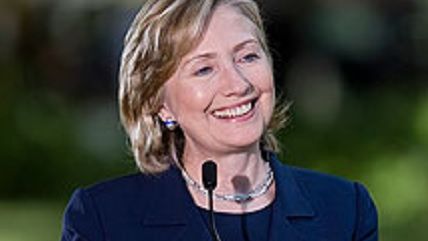Millennials Just Aren't That Into Hillary Clinton, and it Could Cost Her the Election
Being even more condescending toward them probably won't work.


A number of new polls show Libertarian presidential nominee Gary Johnson doing very well with millennials and Democratic presidential nominee Hillary Clinton underperforming with the same demographic that helped President Obama build winning coalitions in 2008 and 2012.
A New York Times/CBS poll shows 26 percent of voters under the age of 29 supporting Johnson and a further 10 percent supporting Green presidential nominee Jill Stein. Similarly, a Quinnipiac poll shows Johnson at 29 percent of young voters, and Stein at 15. In that poll, Clinton barely edges out Johnson among young voters, getting 31 percent. Republican presidential nominee Donald Trump is at 26 percent among that demographic in the poll. Further, a Global Strategy Group poll of millennials in 11 battleground states found 73 percent of millennials saying that Trump was a racist, and just 38 percent supporting Clinton in a 4-way matchup.
The results have yielded unsurprising hand-wringing from older liberals who feel the vote of millennials belongs to them. Clara Jeffrey, editor-in-chief of Mother Jones, tweeted that she has "never hated millennials more" in response to the NYT/CBS poll, which earned refreshing responses from millennials. New York Times columnist Ross Douthat, meanwhile, quips that it looked "like 'liberaltarianism' is a real thing" and that Donald Trump was "very glad" of it.
While Republicans have a few politicians who could be called 'liberaltarian' (two former Republican governors who might be called that are on the Libertarian Party ticket, after all), Trump is not. In a tight race, those votes could be crucial, and Trump has nothing to offer them. Not something to be glad about. The same goes for Democrats, whose nominee has nothing to offer a demographic that has increasingly become more libertarian-friendly.
A Reason-Rupe poll of millennials in 2014 found 66 percent of them believing government was wasteful and inefficient even as many said they planned to vote Democrat in that year and in 2016. The drop off in support for Democrats is unsurprising, given that the rhetoric about government that Democrats deploy does not match the reality on the ground. That reality was bound to catch up with millennials who, even when they are fans of government, give authority the side eye. Many of the responses to Jeffrey's tweets encouraged her sarcastically to keep alienating millennials if she wanted Clinton to win.
The narrative of the older generation of liberals is that Donald Trump is so bad, voters have to hold their nose and vote for Clinton. The option alone of a third party vote is skewered online, mostly by establishment liberals who have increasingly come to represent the poor policy making that has led to a mammoth-sized debt and veritable police state in the U.S. and U.S. warfare state abroad. Donald Trump does not "scare" millennials as much as the mess older voters have made of the country. Clinton's courting of neo-conservatives and figures like Henry Kissinger only serves to alienate millennials more. Johnson's refusal to play political games, like powering through a question about Aleppo without knowing what it's in reference to, while it makes him an easy target for the media establishment to mock, likely ingratiates him to millennials who see both Trump and Clinton as products of a corrupt political system their parents' generation has glorified.
Clinton and President Obama's decision to call Trump a break from Republican tradition instead of the inevitable evolution of it, as more dishonest partisans might frame it, has also placed Johnson and the Libertarian Party in a better position. Millennials are used to start-ups. They are early adopters whose behaviors and decisions are helping drive old giants of industry out of business, from Blockbuster to taxicabs. The latest polls suggest they have the potential to disrupt the political industry in this country in the same way they've disrupted so many others. All the fearmongering over Trump, the cries of false equivalency, and the attempts by millennial "influencers" like Vox.com to frame the Clinton campaign as something transformative millennials ought to get behind, won't bring millennials to heel in the way major parties were able to in days gone by. Neither will false alarms about "spoilers" (spoiler: third parties aren't spoilers, shitty candidates are).
The persistence of never Trump Republicans (even if they don't go for Johnson), combined with Obama and Clinton's refusal (as of yet) to smear the principles of limited government, freedom, and Constitutionalism with Trumpism because of Republicans' history of running on those principles while never acting on them, and the Libertarian party's decision to nominate socially tolerant and fiscally responsible candidates (as many millennials describe themselves) means millennials have the chance to catapult the Libertarian party into major party status, if not through this election cycle alone, almost certainly in cycles to come. Both millennials and Libertarians should expect the smears and attacks to become more vociferous and detached from reality as the old establishment partisan order slowly but surely comes to an end.

Show Comments (108)